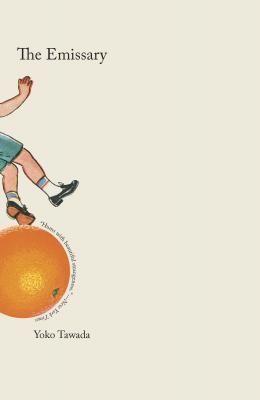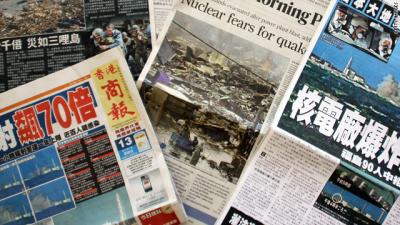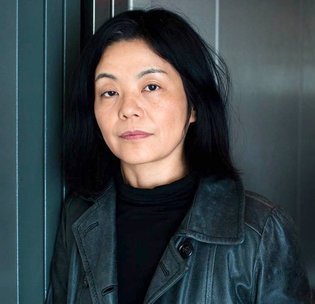The Japanese phrase shikata ga nai is usually translated for Anglophones as “it can’t be helped” or “nothing can be done about it.” The Stanford psychologist Stephen Murphy-Shigematsu maintains that the widespread use of this idiom indicates Japan’s abiding attitude toward disaster – a tolerance of vulnerability. It connotes the survivor’s embrace of adversity with gratitude for what remains and persists. Others have theorized that shikata ga nai tamps down anxiety, keeps blood pressure low, and extends life expectancy. Even so, there is a tremor in the locution like an archipelago-dweller’s memory of millennial earthquakes. Shikata ga nai is not the equivalent of C’est la vie or Che sera sera or “keep a stiff upper lip.”
 Perhaps shikata ga nai accounts for the robust health of Yoshiro, the 107-year old writer in Yoko Tawada’s novel The Emissary. He frets over the chronically poor health of his great-grandson Mumei who, like all children in their futuristic Japan, is febrile and has difficulty walking and eating, a result of an unnamed human-caused catastrophe. The anonymous narrator says, “Like most children of his generation, Mumei was unable to absorb the calcium he needed. Human beings may turn into a toothless species someday, Yoshiro thought.”
Perhaps shikata ga nai accounts for the robust health of Yoshiro, the 107-year old writer in Yoko Tawada’s novel The Emissary. He frets over the chronically poor health of his great-grandson Mumei who, like all children in their futuristic Japan, is febrile and has difficulty walking and eating, a result of an unnamed human-caused catastrophe. The anonymous narrator says, “Like most children of his generation, Mumei was unable to absorb the calcium he needed. Human beings may turn into a toothless species someday, Yoshiro thought.”
In this toxic, quaking world, automobiles and the Internet have disappeared, but now solar-powered carrier pigeons deliver messages. Foreign travel is prohibited. Yoshiro explains: “Every country has serious problems, so to keep those problems from spreading all around the world, they decided that each country should solve its own problems by itself.” Although Tokyo is now a thinly populated city, life carries on elsewhere, regulated by suddenly announced but sporadically enforced guidelines and restrictions. Many words, especially those derived from English, are prohibited but old people use them anyway when speaking quietly among themselves.
 As The Emissary proceeds, Tawada fills out this dystopia with a series of ills. Men experience prolonged periods of menopause. Sexual identity may become uncertain as bodies fluctuate between male and female. But the novel is not primarily invested in social critique nor does it use its noxious environment to provoke the characters to act or the plot to progress. Tawada’s work has always been more interested in disquieted notions of dislocation, jumbled or imposed identities, and the urgencies of expression. Disquieted, yes, but shaded throughout with a comic verve and a wondering innocence.
As The Emissary proceeds, Tawada fills out this dystopia with a series of ills. Men experience prolonged periods of menopause. Sexual identity may become uncertain as bodies fluctuate between male and female. But the novel is not primarily invested in social critique nor does it use its noxious environment to provoke the characters to act or the plot to progress. Tawada’s work has always been more interested in disquieted notions of dislocation, jumbled or imposed identities, and the urgencies of expression. Disquieted, yes, but shaded throughout with a comic verve and a wondering innocence.
There are three intertwined movements in The Emissary, beginning with the daily life and reflections of Yoshiro – his dissolved marriage, the distance between himself and his only daughter, the dissipations of his grandson, and now, Yoshiro’s caretaking of his great-grandson. The inner life of Mumei shapes the book’s second strand. The boy’s cognition seems to merge ordinary inquisitiveness with the warpage of physiological stress on his brain. The third of the novel’s strands is the dystopian world itself. As in Tawada’s splendid novel Memoirs of a Polar Bear, once her inventive premise has been established, she dwells within the routines of her characters, tracks their quirky perceptions, and cultivates a placidly plaintive tone. Every morning Yoshiro prepares breakfast which Mumei struggles to eat; Yoshiro worries and Mumei consoles him.
 Tawada was born in Tokyo in 1960 and enrolled at Hamburg University in 1982 to study contemporary German literature. She then earned a doctorate at the University of Zurich and has lived in Germany ever since. Drawn instinctively to Kafka, Benjamin, Schulz and Celan, she enlisted herself as their heir. If Memoirs of a Polar Bear is Tawada’s symphony of distorted relationships through time, The Emissary is more of a chamber piece, engrossing but fulfilled in a more modest manner, perhaps aligned with what I imagine to be Yoshiro’s practice of shikata ga nai.
Tawada was born in Tokyo in 1960 and enrolled at Hamburg University in 1982 to study contemporary German literature. She then earned a doctorate at the University of Zurich and has lived in Germany ever since. Drawn instinctively to Kafka, Benjamin, Schulz and Celan, she enlisted herself as their heir. If Memoirs of a Polar Bear is Tawada’s symphony of distorted relationships through time, The Emissary is more of a chamber piece, engrossing but fulfilled in a more modest manner, perhaps aligned with what I imagine to be Yoshiro’s practice of shikata ga nai.
The notion of “the emissary” is manifest in two ways in the novel. Yoshiro had written a novel called Ken-to-shi, Emissary to China, but because the text included so many prohibited foreign place names, he decided to bury the manuscript. Also, Mumei’s teacher has been assigned to select one special student as an emissary who would travel abroad to an international medical research institute. Strangely, by the novel’s conclusion, whether Mumei will be chosen is hardly suspenseful. Tawada has led us into a troubled forbearance.
[Published by New Directions on April 24, 2018. 138 pages, $14.95 paperback]